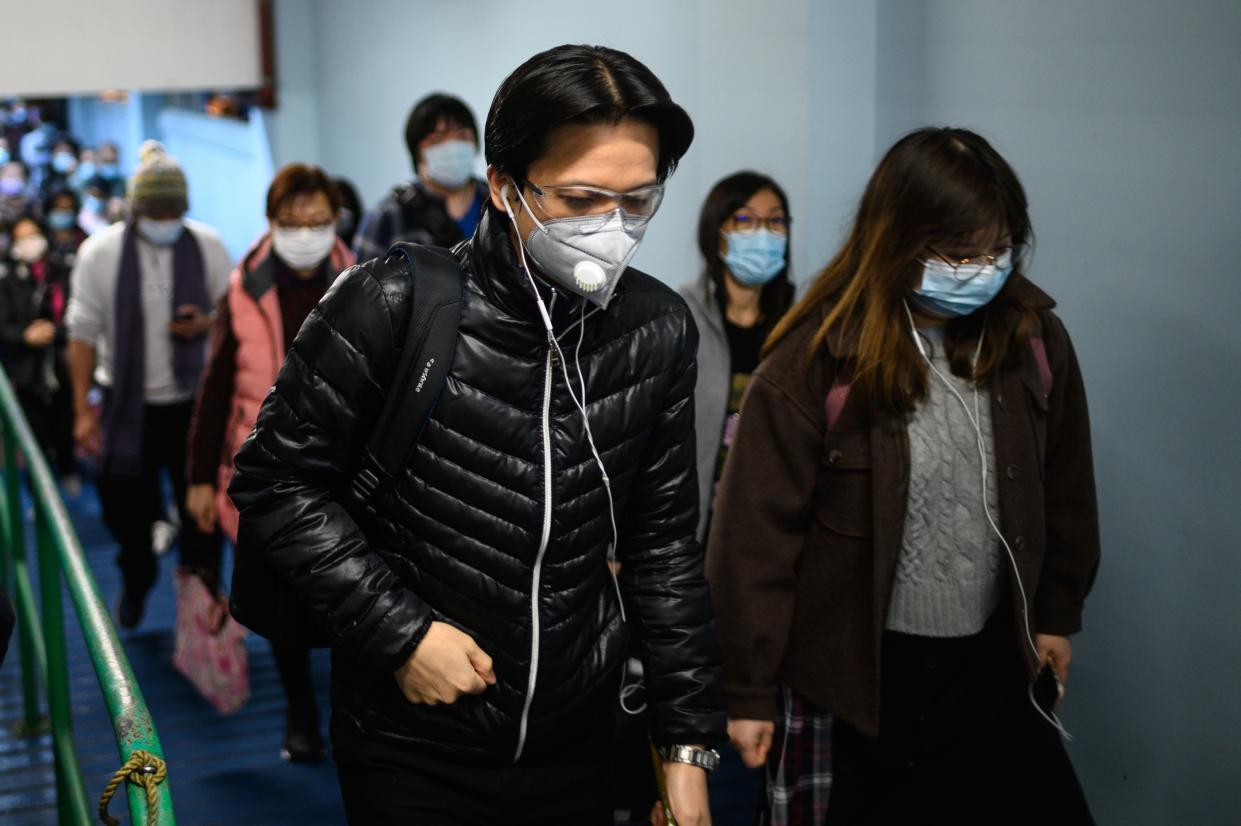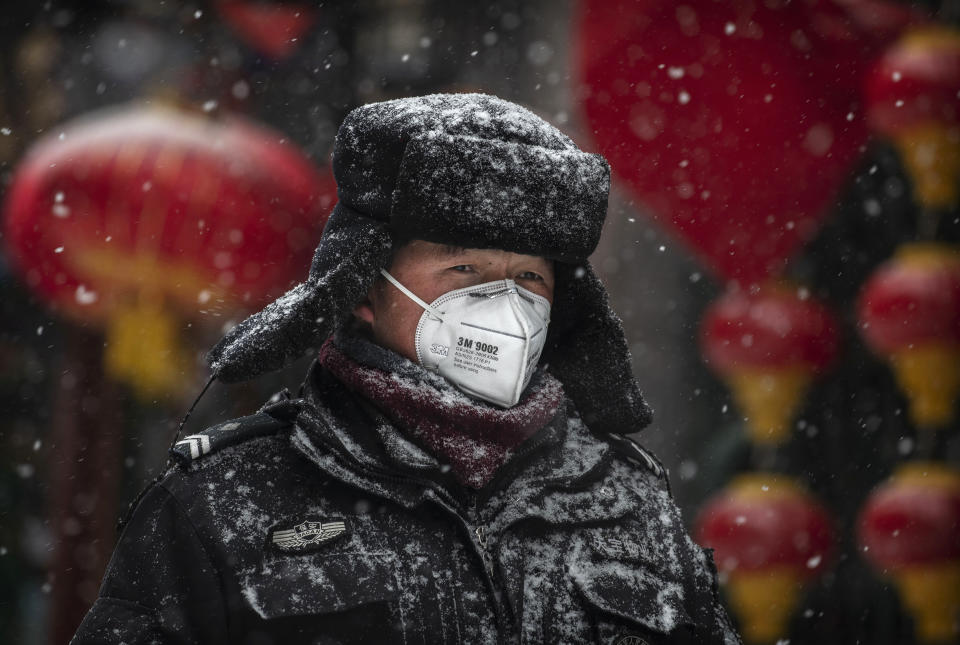Coronavirus cannot be cured by drinking 'garlic water', experts say

Fears over catching China’s deadly coronavirus have spread worldwide.
Since the previously unknown strain started in the city of Wuhan at the end of last year, it has reached at least 25 countries, including the US, UK and Australia.
China alone has reported more than 24,300 cases, with the death toll reaching 490 on Wednesday.
READ MORE: Coronavirus vaccine 'will not be available until mid-2020', pharma exec warns
With no “cure” and limited treatment options, many are turning to the weird and wacky in attempts to protect themselves.
Facebook, Twitter and YouTube are awash with self-proclaimed “experts” claiming that garlic-infused water may ward off coronavirus and that the disease started in rhino horns.
Does ‘garlic water’ protect against the new coronavirus?
In a post that has been liked by 180 Facebook users and shared 106 times, the “Helpfull Blog” claims that “Wuhan's coronavirus can be cured by one bowl of freshly boiled garlic water”.
An “old Chinese doctor” reportedly recommends boiling eight cloves of chopped garlic with seven cups of water.
“Eat and drink the boiled garlic water, overnight improvement and healing,” the post adds.
Experts have been quick to debunk the false claims.
“There is no scientific evidence to substantiate the claim that garlic boiled water cures the novel coronavirus nor is there any proper medical research available on the subject,” Dr Wasim Khawaja, from the Pakistani Institute of Medical Sciences, told AFP.
“Such claims on social media that this vegetable or that herb cures the novel coronavirus are misleading, and they may be harmful for people as they indulge in these homemade remedies and do not visit a hospital for testing, and this may lead to the spread of the virus if anyone is actually infected by it.”
In response to the rumour, the World Health Organization (WHO) added: “Garlic is a healthy food that may have some antimicrobial properties.
“However, there is no evidence from the current outbreak that eating garlic has protected people from the new coronavirus.”

Did the new coronavirus come from rhino horns?
As if garlic as a cure was not bizarre enough, social media posts also allege the virus originated in rhino horns.
A Facebook post that has been shared 608 times warns: “It’s believed the coronavirus is possibly caused due to the use of rhino horn.”
Experts have been quick to shut these claims down.
“Viruses need live cells, live organisms for themselves to replicate, so even the rhino horn as such, even if it’s still on the rhino, would not be able to be infected with the virus because the rhino horn is dead, it's like our fingernails,” Professor Wolfgang Preiser, from the University of Stellenbosch in South Africa, told AFP.
“A virus cannot grow in your fingernails.”
By the time a rhino horn is traded, it could have been detached for weeks, months or even years, making it even less suitable for virus survival, Prof Preiser added.
“There are a lot of rumours being spread, it's many fools jumping on the bandwagon, and I think they are doing a lot of harm by confusing people and confusing the message,” he said.
READ MORE: Coronavirus 'could share 89% of its DNA with Sars' – supporting theory it started in bats
The new coronavirus is thought to have emerged at a seafood and live animal market in Wuhan, which sold everything from hedgehogs to donkeys.
Coronaviruses are “RNA viruses”, which means they “mutate all the time”, Yahoo UK reported.
In simple terms, RNA is a “precursor” to the more well-known DNA.
Exposure to live animals at the market likely enabled the virus to “jump” from its origin species into humans.
Scientists from Peking University in Beijing reported the virus likely started in bats before moving into snakes as an “intermediate host” and then infecting humans.
This is similar to what happened with severe acute respiratory syndrome (Sars), which killed 774 people in its 2004 outbreak.
The masked palm civet, a mammal native to the Indian subcontinent and south-east Asia, was an intermediate host for Sars between bats and humans.
Scientists from Fudan University in Shanghai found that the new coronavirus appears to be 89.1% genetically similar to “a group of Sars-like coronaviruses”, Yahoo UK reported.
With Sars having started in bats, this suggests the nocturnal creatures may also be responsible for the new coronavirus.
Is drinking water key to not getting the new coronavirus?
Another dangerous message circulating the web is the suggestion that drinking water may be enough to keep you virus-free.
In a post that has been shared 16,000 times, one Facebook user urges his followers to “keep your throat moist”.
The self-proclaimed “health bulletin” adds: “Thus do not hold your thirst because once your membrane in your throat is dried, the virus will invade into your body within 10 mins.”
A similar post even claims the advice comes from the “Canadian Department of Health”.
Health Canada told AFP it did not issue the advice.
While drinking plenty of water is good for overall health, there is no evidence it will ward off the coronavirus.
READ MORE: Coronavirus ‘may have infected seven times more people than reported’
To protect yourself, the WHO recommends washing hands frequently with soap and water or an alcohol-based sanitiser.
Avoid touching your nose, eyes or mouth to prevent infection.
When you cough or sneeze, try to do it into a tissue, then throw it away immediately.
In the most severe cases, victims of the coronavirus are succumbing to pneumonia.
This is usually caused by bacteria, which tend to respond to antibiotics.
When a virus is to blame, pneumonia may be treated via “antiviral medication”, according to the American Lung Association.
The US Centers for Disease Control and Prevention has warned that there is no specific treatment for coronaviruses.
Professor Peter Horby from the University of Oxford added there is “no effective antiviral” at the moment.
What is the new coronavirus?
Like other coronaviruses, the new strain initially causes flu-like symptoms, such as breathlessness and fever.
Most of those who initially fell ill worked at or visited the market.
China's National Health Commission confirmed that the virus can spread person-to-person, via sneezing, coughing or shaking contaminated hands.
Fatal pneumonia comes about when a respiratory infection causes the alveoli (air sacs) in the lungs to become inflamed and filled with fluid or pus, according to the American Lung Association.
The lungs then struggle to draw in air, resulting in reduced oxygen in the bloodstream.
“Without treatment the end is inevitable,” said the charity Médecins Sans Frontières.
“Deaths occurs because of asphyxiation.”


